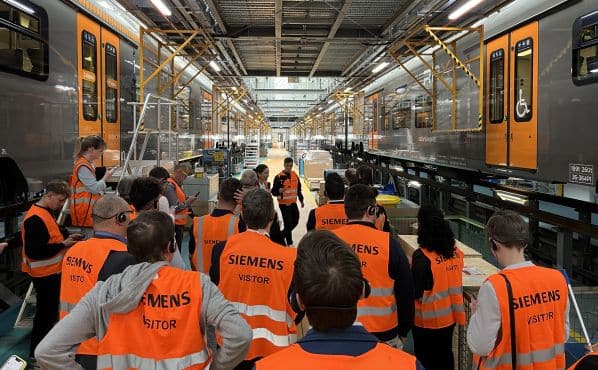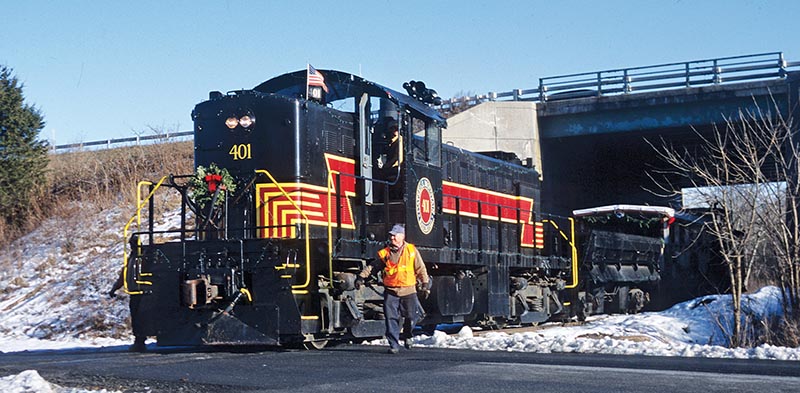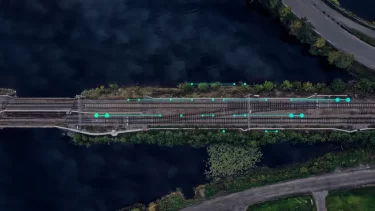SIEMENS Mobility has confirmed an approximate €150m investment to expand the capacity and capability of its service and maintenance depot at Dortmund-Eving in Germany.
The centrepiece is the construction of a new 12,300m2 service building for the service and maintenance of additional fleets at the site, including 400m-long trains, which will be able to access the facility from both ends. The new building will also include additional storage, offices and workshops. Work is set to begin this year and the total 8.75ha expansion will grow the existing 7ha site to 15.75ha when the project is completed in 2026.
The current facility opened in 2018 and is used primarily to maintain the fleet of 84 class 462 Desiro HC four-car EMUs operated by National Express’ Rhine-Ruhr Express (RRX) service on four of the depot’s six tracks. The remaining two tracks are used by other operators, with a German Rail (DB) ICE3 high-speed train and a class 463 Mireo EMU operated by DB Regio on the Rhine Neckar S-Bahn network in Baden-Württemberg occupying these two tracks during IRJ’s visit on May 7.
End-to-end maintenance
Siemens invited guests to learn more about the maintenance services it offers at Dortmund-Erving.
Five of the tracks are reserved for light maintenance activities, with the sixth used for bogie maintenance, where car bodies are lifted using jacks. This is the only track that is not electrified. The depot is also equipped with an underfloor wheel lathe supplied by Talgo, an automated train washing facility and additive manufacturing (AM) lab to produce spare parts in-house.
Siemens arranged tours of the facility for invited guests, including IRJ, to showcase the end-to-end digital maintenance provided at the site. The manufacturer says it aims to provide 100% availability of the trains serviced at the depot where it takes a “pit stop”-style approach to light maintenance.
At the heart of this approach is a predictive maintenance strategy based on the analysis of diagnostic data captured by train-mounted sensors. This information is fed into Siemens’ Railigent X digital platform where it is analysed using AI-based algorithms to recognise trends in the health and performance of components in order to schedule and perform maintenance before faults appear.
In addition, each train passes through Germany’s only automated vehicle inspection (AVI) system when entering and exiting the train washing facility, which the RRX trains are required to do every 10 days under Siemens’ service contract. The AVI system assesses the condition of wheelsets, wheel profiles and treads, as well as brake pads and discs, again feeding this data into Railigent, which is able to assess when specific maintenance is required, taking into account the characteristics of the routes where each train operates.
The maintenance and work order schedule is developed based on analysis of this data, while a specialist scheduling system, Cormap, which is based on IBM Maximo, is able to identify when specific trains will be required for service or light maintenance, informing operators of when a train will be out of service and for how long so they can plan appropriately.
The depot itself is entirely paperless, with screens in break areas informing staff of which trains are on each track, the condition of each vehicle, and which service and maintenance tasks will be performed during that shift. Personal tablet computers are assigned to each employee and are used to inform them of the specific work order and activity they must perform. They in turn record their work activities using the tablet, which also provides vehicle and system information and maintenance tutorials. Staff gain access to the tool store by using their own card key card, and are only issued with those tools which they are qualified to use.
Some of the spare parts produced by the additive manufacturing facility at the depot (left). The tablet that staff use to record and monitor maintenance tasks.
The benefits of the predictive maintenance regime include enabling personnel to position spare parts where they are required along the length of the train ahead of the start of maintenance work, helping to minimise the time the train is in the depot. Commonly used spare parts and components – including an extensive sticker collection – are kept in storage at the depot. Staff can also access Siemens’ wider network of spare parts stored at other facilities to ensure just-in-time delivery for specific train types. Siemens says this service evolved and grew significantly during the Covid-19 pandemic when supply chain challenges resulted in difficulties of supply. The AM facility is intended to supplement rather than replace existing suppliers of key components.
The depot currently employs around 150 people working across three shifts. Expansion is expected to add another 100 posts. Other future plans include the transition from manual to fully-automated vehicle inspection based on computer vision, AI, and digital twins.
“Our digital service depot in Dortmund is one of the most modern rail service centres in Europe,” says Mr Michael Peter, CEO of Siemens Mobility. “By investing in additional depot capacity, we are responding to the growing demand for services.”
The post Siemens to invest €150m in Dortmund depot expansion appeared first on International Railway Journal.


